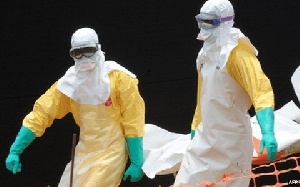A new economic impact assessment from the World Bank Group has predicted that the two-year regional financial impact of countries affected by Ebola in West Africa could reach $32.6 billion by 2015.
According to the World Bank Group’s new analysis, the economic impact of Ebola is very serious in the core three countries particularly Liberia and Sierra Leone and could become catastrophic under a slow-containment, High Ebola scenario.
“In broader regional terms, the economic impact could be limited if immediate national and international action stop the epidemic and alleviate the ‘aversion behaviour’ or fear factor that is causing neighbouring countries to close their borders, and airlines and other regional and international companies to suspend their commercial activities in the three worst-affected countries”.
A statement issued by the Office of the World Bank Group in Washington and copied to Ghana News Agency noted that with the latest death toll from Ebola now at 3,439 in the three worst-affected countries of Guinea, Liberia, and Sierra Leone, “ it is far from certain that the epidemic will be fully contained by December 2014 and in light of the considerable uncertainty about its future trajectory, two alternative scenarios are used to estimate the medium-term (2015) impact of the epidemic, extending to the end of calendar year 2015”.
Mr Jim Yong Kim, President of the World Bank Group said: “With Ebola’s potential to inflict massive economic costs on Guinea, Liberia, and Sierra Leone and the rest of their neighbours in West Africa, the international community must find ways to get past logistical roadblocks and bring in more doctors and trained medical staff, more hospital beds, and more health and development support to help stop Ebola in its tracks.”
The statement mentioned the successful containment of Ebola in Nigeria and Senegal and said so far it was evident that it was possible, given some existing health system capacity and a resolute policy response.
A “Low Ebola” scenario corresponds to rapid containment within the three most severely affected countries, while “High Ebola” corresponds to slower containment in the three countries, with broader regional contagion.
Health News of Tuesday, 14 October 2014
Source: GNA
World Bank predicts economic loss in Ebola hit countries
Entertainment












